A recent ruling by the US Supreme Court severely limits the rights of the US government in climate protection measures. The US Supreme Court has ruled that the government has no right to oblige coal and gas power plant operators to reduce emissions. This severely limits the authority of the US Environmental Protection Agency (EPA). In future, it will no longer be allowed to issue regulations to reduce carbon emissions from power plants. The agency was previously allowed to prescribe the emissions of power plants on the basis of the Clean Air Act.
Supreme Court restricts Biden’s climate protection measures
The Supreme Court’s ruling is also a setback for the climate protection programme of US President Joe Biden. He has already had new targets for reducing CO₂ emissions from coal and gas-fired power plants drawn up. These are now likely to be invalidated by the ruling.

Image: Phil Roeder, CC BY 2.0, via Wikimedia Commons
Biden tries to push through measures by bypassing Congress
Since taking office, President Joe Biden has tried to accelerate the energy transition in the USA with several laws. However, he has repeatedly encountered stiff resistance in Congress. For this reason, Biden has tried to implement the climate protection goals through national authorities such as the EPA, bypassing Congress. This approach has now been severely restricted, if not made impossible, by the Supreme Court’s ruling. In their ruling, the six conservative judges referred to the Major Questions doctrine. This doctrine stipulates that measures that are of great importance and have a high societal impact require the approval of Congress. There, however, Biden has hardly any chance of getting his plan through because of the majority.
Climate protection targets of the US government hardly achievable any more
Biden has envisaged complete climate neutrality in electricity generation in his programme by 2035. However, this goal is no longer likely to be achievable with the ruling. The ruling also raises new legal questions about the extent to which decisions by other federal agencies besides the Environmental Protection Agency (EPA) are affected and may have to be revised.
The process was initiated by several Republican states led by West Virginia
